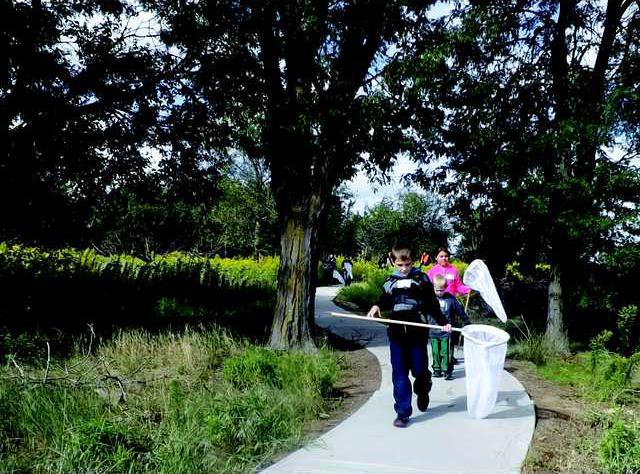Most Kansas festival planners are at the mercy of Mother Nature to some degree, especially when nature is the featured attraction. Saturday’s weather, an early taste of fall, was perfect for most humans attending the Kansas Wetlands Education Center’s annual fall Butterfly Festival. Those who wished they’d brought a jacket could sip coffee or hot chocolate indoors before heading outdoors in the 55-degree weather.
Unfortunately, the guests of honor – swarms of monarch butterflies headed to Mexico for the winter – have not yet arrived in large numbers, so children and adults who ventured into the sunflower field with nets to search for specimens to tag didn’t have much luck. There were more butterflies inside, at the insect zoo and at the craft table where kids could learn to fold origami butterflies.
Pam Martin, an educator at the Wetlands Center, said it’s typical for the monarch migration to be going strong here around Sept. 24.
“We’re just on the very beginning of migration,” Martin said. KWEC staff chose the early date because the butterflies have arrived early for the past three years. Martin attributes that to the drought conditions, which have eased this year. She predicts the butterflies will be here in abundance by Sept. 21.
Kansans can help future generations of butterflies by creating butterfly gardens. The top nectar plants for adult butterflies are: black-eyed Susan; Joe-Pye weed, aster, butterfly weed, lantana, purple cornflower, butterfly bush, liatris (blazing star or gay feather), coreopsis and pentas.
Planting milkweed is especially recommended to provide food for monarch butterflies in the caterpillar stage.
Those who attended Saturday’s free event at the KWEC received milkweed plants to take home.
The tagging project is an ongoing research project through the University of Kansas Monarch Watch. In past years, monarch butterflies have been recovered at overwintering sites in Central Mexico about 1,125 miles away.
Butterfly Fest
Wetlands Center celebrates fall monarch migration





